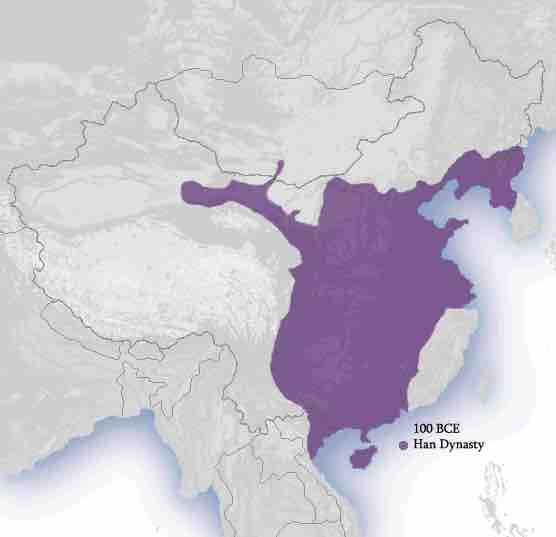Overview: The Han Dynasty
The Han Dynasty was an imperial dynasty of China, preceded by the Qin Dynasty (221–207 BCE) and succeeded by the Three Kingdoms (220–280 CE). It was founded by the rebel leader Liu Bang, known posthumously as Emperor Gaozu of Han. It was briefly interrupted by the Xin Dynasty (9–23 CE) of the former regent Wang Mang. This interregnum separates the Han into two periods: the Western Han (206 BCE – 9 CE) and the Eastern Han (25–220 CE). Spanning over four centuries, the period of the Han Dynasty is considered a golden age in Chinese history. To this day, China's majority ethnic group refers to itself as the "Han people," and Chinese characters are referred to as "Han characters".

Han dynasty in 100 BC
The Han Dynasty was an imperial dynasty of China, preceded by the Qin Dynasty (221–207 BCE) and succeeded by the Three Kingdoms (220–280 CE).
Han Philosophy
The early Western Han court simultaneously accepted the philosophical teachings of Legalism, Huang-Lao Daoism, and Confucianism in making state decisions and shaping government policy. However, the Han court under Emperor Wu gave Confucianism exclusive patronage.
Confucianism
Confucianism is Chinese ethical and philosophical system developed from the teachings of the Chinese philosopher Confucious (551–479 BCE). Confucianism originated as an "ethical-sociopolitical teaching" during the Spring and Autumn Period, but during the Han Dynasty it developed metaphysical and cosmological elements. At the core of Confucian ethics were the selected virtues of filial piety, harmonious relationships, ritual, and righteousness.
Unlike the original ideology espoused by Confucius, Han Confucianism in Emperor Wu's reign was the creation of Dong Zhongshu (179–104 BCE). Dong was a scholar and minor official who aggregated the ethical Confucian ideas of ritual, filial piety, and harmonious relationships with the five phases (i.e., the natural cycles which governed Heaven, Earth, and Man) and yin-yang cosmologies. Much to the interest of the ruler, Dong's synthesis justified the imperial system of government within the natural order of the universe.
Education
In 136 BCE, Emperor Wu abolished all academic chairs (boshi 博) not dealing with the Confucian Five Classics, and encouraged nominees for office to receive a Confucian-based education at the Imperial University that he established in 124 BCE. The Imperial University grew in importance as the student body grew to over 30,000 by the 2nd century CE. A Confucian-based education was also made available at commandery-level schools, and private schools opened in small towns, where teachers earned respectable incomes from tuition payments.
Notable Texts
Some important texts were created and studied by scholars during this time. Philosophical works written by Yang Xiong (53 BCE – 18 CE), Huan Tan (43 BCE – 28 CE), Wang Chong (27–100 CE), and Wang Fu (78–163 CE) questioned whether human nature was innately good or evil and posed challenges to Dong's universal order. The Records of the Grand Historian by Sima Tan (d. 110 BCE) and his son Sima Qian (145–86 BCE) established the standard model for all of imperial China's Standard Histories, such as the Book of Han written by Ban Biao (3–54 CE), his son Ban Gu (32–92 CE), and his daughter Ban Zhao (45–116 CE). There were dictionaries such as the Shuowen Jiezi by Xu Shen (c. 58 – c. 147 CE) and the Fangyan by Yang Xiong. Biographies on important figures were written by various gentrymen.
Han dynasty poetry was dominated by the fu genre, which achieved its greatest prominence during the reign of Emperor Wu. Fu are intermediary pieces between poetry and prose in which a place, object, feeling, or other subject is described and rhapsodized in exhaustive detail and from as many angles as possible. Classical fu composers attempted to use as wide a vocabulary as they could, and often included great numbers of rare and archaic terms in their compositions. Fu poems employ alternating rhyme and prose, varying line length, close alliteration, onomatopoeia, loose parallelism, and extensive cataloging of their topics.